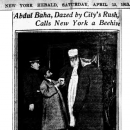Main menu
- ‘Abdu’l-Bahá’s Journey
- World Peace
- Stopping Racism in America
- Empowerment of Women
- More Principles...
- Prayer for America
‘Abdu’l-Bahá, Dazed by City’s Rush, Calls New York a Beehive
Is “Beautifully Tired” After Sightseeing Tour in Automobile and Calls for His Turkish Coffee and Candy He Brought from Home.
‘Abdu’l-Bahá Abbas, promoter of the new religious code which has about 20,000,000 adherents, was very tired yesterday after his speedy tour of busy New York. He crossed the Williamsburg Bridge and went to the home of Howard McNutt, No. 935 Eastern Parkway, Brooklyn; thence to the houses of a few friends, to the Cooper Institute and back across the Williamsburg Bridge through the east side at the rush hour. Then he visited homes of friends and went back for a brief rest in his luxurious apartment in the Ansonia. And how he did relish that cup of coffee — Turkish coffee — as he sat down in a red plush chair!
New York is a beehive in the estimation of ‘Abdu’l-Bahá Abbas, and all the busy men and women bees laboring and working for the drone. He was dazed when he saw the throngs of busy humanity walking and running with their intentions focussed on one place — Brooklyn.
Then he saw the east side, and to him that was wonderful. His automobile stopped for a few minutes on the Manhattan side of the Williamsburg Bridge and almost before it had drawn up to the curb there were scores of children wondering who was the aged man with the long beard. He leaned out of the window and then decided to rest his head on the cushioned back of the vehicle.
“I like New York,” he told a HERALD reporter. “It is interesting and it is clean. London is filled with smoke.” Mirza Ahmad Sohrab, treasurer of the Persian American Educational Society in Washington, D. C., acted as ‘Abdu’l-Bahá’s interpreter. He did it well, too. But Mr. Sohrab never interrupted ‘Abdu’l-Bahá.
Tells of His Imprisonment.
A frown crossed his brownish countenance when his opinion of ‘Abdul Hamid was sought. The erstwhile Sultan of Turkey was responsible for ‘Abdu’l-Bahá’s incarceration for forty-two years.
“You can tell what he is now,” was all the aged man said as he took a pinch of snuff from a dark brown box. “For nine years I was not permitted to go outside the walls of the prison, and after that only very seldom. It was a dingy, desolate, grimy old prison, and ‘Abdul Hamid had spies and police after me all the time I was there.”
One of the Persians commented on the fact that ‘Abdu’l-Bahá was enjoying liberty while the man who had caused him to go to jail because certain doctrines were taught which the Sultan did not like was himself imprisoned.
“Women are very busy here,” said ‘Abdu’l-Bahá. “They have done great things the world over, and even in Asia there is a great change among them.”
Just then a gentle tap on the door, which was answered with a grunt, disclosed to view a Persian, garbed in a long black flowing gown and wearing a black fez. He held a tray on which was a cup of black coffee, and slowly and ceremoniously he approached ‘Abdul. The Persian waited, erect and dignified, while ‘Abdu’l-Bahá slowly sipped the coffee. Another grunt was the announcement that ‘Abdul had had all the coffee he wished. The Persian bowed low, put forward the tray and bore the cup away.
“I do not consider myself a Persian,” said ‘Abdu’l-Bahá. “The whole earth is my native land, and all the men and women are my brothers and sisters. The Persian government did not interfere when I was placed in prison because they adhered to the same principles as the Sultan of Turkey.”
The Persian interpreter sighed, and ‘Abdu’l-Bahá frowned. In fact, he looked cross every time the name of ‘Abdul Hamid was mentioned.
When asked what he delighted in most in the way of edibles he laughed and looked sarcastic. To him, he said, all foods were the same. It was not a question which he wished to discuss, and the mere mention of dinner caused him to wave back and forth a bunch of carnations he held in his right hand.
He Likes Candy.
The subject of meats, however, caused him to observe that there were several persons in the other room who wished to talk to him, at least so it was translated to the reporter. Many Americans and Persians in this country pay homage to ‘Abdu’l-Bahá.
On the way from Brooklyn the aged man, who confesses to being sixty-eight years old, told stories to Mr. McNutt and the Persians in his entourage. At the end of each story, which was always in the form of a parable, ‘Abdu’l-Bahá stroked his long beard and touched his long locks. He is the son of Bahá’u’lláh, whose coming was foretold by the Báb, a religious revolutionist, who was unpopular in Persia seventy years ago and therefore was executed. It was then asserted that the Báb had the evil eye.
‘Abdu’l-Bahá has his cloak lined with sable fur, and he loves children — and Turkish delight, which species of candy decorated a table in one of the rooms of the large apartment. It was said that ‘Abdu’l-Bahá had brought the Turkish delight all the way from the land where he had been imprisoned for many years.
It was nine o’clock last night when ‘Abdu’l-Bahá returned to his apartment, and not long thereafter he ceremoniously told all the Americans and Persians that he was going to sleep, as New York, though superb, had made him “beautifully tired.”
[picture caption: ‘ABDU’L-BAHA LEAVING A TAXICAB AT THE ANSONIA.]









